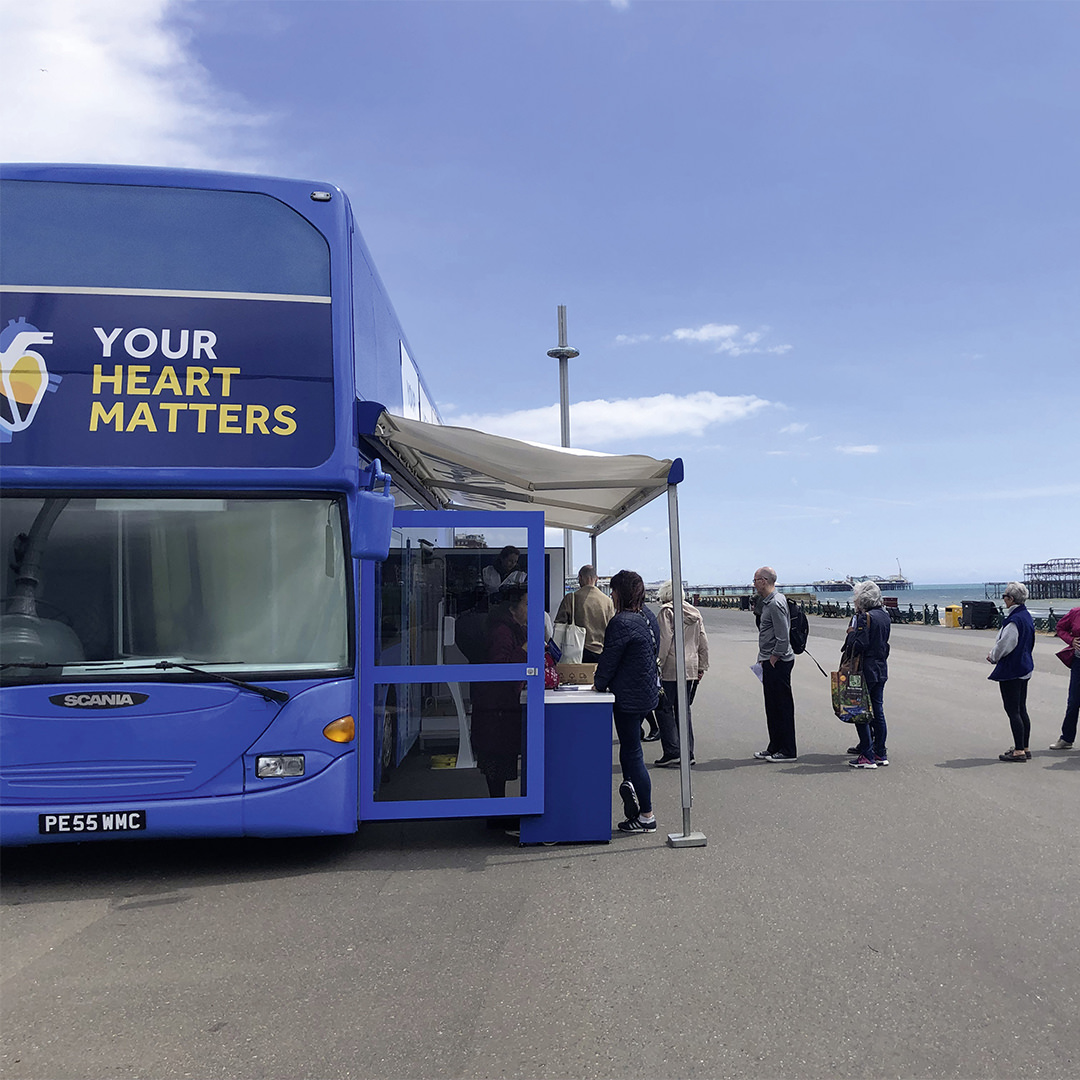


University Hospitals Sussex NHS Foundation Trust cardiologists and UK initiative, Valve for Life, are offering free heart checks from a pop-up bus in the city in an attempt to find people who may be unaware that they have heart valve disease. On Thursday 7th September from 10am to 3pm, the team will be in ASDA carpark, Brighton Marina on a blue ‘Your Heart Matters’ bus.
The bus will be offering five-minute stethoscope checks – a simple and easy way to check for heart valve disease.
Brighton has been chosen as one of the cities as it has a worldwide reputation for providing world class cardiac care.
Heart valve disease affects approximately 1.5 million people in the UK. Patients experience fatigue, shortness of breath, loss of consciousness, and if left untreated, develop severe aortic stenosis, the most common form of heart valve disease, which is fatal within two years of diagnosis. The symptoms of heart valve disease may not be immediately obvious. It is estimated that it kills 4 times as many people as COVID-19 in a year. However, once treated patients can return to a good quality of life, largely free of symptoms.
It is only during an in-person appointment that a GP can have that quick listen to the chest of an older person and then refer the patient for echocardiogram. This means far fewer heart valve diseases will be picked up. There are conditions with high fatality rates, such as aortic stenosis, where 50% patients will die within two tears if left untreated.
Dr Jonathan Byrne, Interventional Cardiologist at Kings College Hospital NHS Trust and Director of the UK Valve for Life programme said:
“The bus has seen thousands of people with remarkable results. On average, we are detecting a cardiac condition in about 12% of people who have a stethoscope check.
On the day, anyone who is diagnosed with a heart murmur or irregular pulse will be given a letter to share with their GP for further investigations.
A face-to-face stethoscope examination remains the most straightforward method to detect the key characteristic associated with valve disease – a heart murmur. This condition, if left untreated, can have life-threatening consequences.”
Dr James Cockburn, Consultant Cardiologist, Brighton and Sussex University Hospital NHS Trust, comments:
“The heart bus is a fantastic way to educate the nation on the symptoms of heart valve disease. It allows for early detection of heart valve disease and arrhythmia. I’m looking forward to seeing a lot of people on Thursday – the response I’m sure will be brilliant and we will detect a number of cardiac conditions. It’s important we spot them early.”
One patient who knows the value of a stethoscope check is Morgan Lee-Stephens, 64, whose life was saved by urgent treatment following her valve disease diagnosis.
“I’d noticed beginning to feel a bit weaker whilst dropping my grandchildren off at school. By the time I’d reach the top of the incline, I would feel breathless, dizzy and a sharp pain in my chest. But it would pass and I‘d carry on. I mentioned it in passing to my doctor who performed a quick stethoscope check on me. She advised I go to the hospital right away as I had a strong heart murmur. At the time I had been planning to go on holiday so I was hoping the outcome wouldn’t be too serious. I went for an echocardiogram in London and the cardiologist confirmed that I could not go anywhere – I had severe aortic stenosis and needed an urgent heart procedure.
I was knocked for six by my diagnosis. I had no history of heart problems in the family and, as someone who usually goes to the gym three times a week, just assumed I had gotten unfit over the pandemic. After waiting several weeks to see a heart surgeon, I was told that due to Covid delays I had up to a six-month wait for treatment. For severe cases like me, the waiting time for treatment should be no longer than eight weeks from diagnosis. Due to the emotional stress this bore on both myself and my family, I decided to take matters into my own hands and sought treatment privately. And am I grateful I did so. Within weeks, I had my aortic valve replacement booked and the surgeon said that at the time of being operated on, my valve – which should have been the size of a fifty pence coin – was the size of a pinhole. If I hadn’t had my treatment when I did, there is a real chance I wouldn’t still be here today.
Now, I am back to daily life and get to spend time with my grandchildren and watch them grow up. I would advise anyone – even if you consider yourself fit and healthy, to get their heart checked. My experience is proof that it might just save your life.”
To find out more about the Your Heart Matters Bus, please visit: https://www.valveforlife.co.uk/valveforlifebustour.